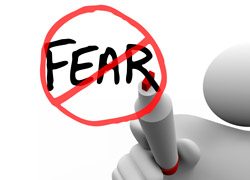When you have relaxed conversations with many traders you'll find the shared experiences invaluable. Whilst sharing thoughts on; brokers, economic sentiment, strategies etc. is fascinating, one of the most intriguing aspects is how we overcame the barriers we faced on our journey towards proficiency and profitability. Some of these barriers are incredibly difficult to overcome, some are self inflicted, one of the most potent is the fear of 'pulling the trigger', quite simply being afraid to put a trade on…
It's worth closely examining this debilitating trader issue as it inevitably strikes most traders at some stage in their trader metamorphosis. However, looking for remedies is not a simple process, given that it's generally the complex issues of the traders own personality that are the root cause of the problem.
The most common fear preventing pulling the trigger is position size. The stress of potentially losing money can lead to 'trader paralysis'. The remedy is simply, reduce your size to a position where you feel more relaxed. For example, if you have an account of €10,000 then instead of risking the recommended 1-2% of the account per trade, choose a lower figure, perhaps 0.3%, bearing in mind that at this level the returns will lower and you may struggle to build any critical mass to your account. However, the losses will also be proportionality reduced. Once your confidence is restored slowly build up your risk gradually, perhaps adding 0.2% more risk per week/month over a set target/period of time.
Open a FREE Forex Demo Account Now To Practice
Forex Trading In A Real-life Trading & No-risk Environment!
There is another slightly more complex issue that can prevent pulling the trigger and it relates to not having enough confidence in your edge. That lack of confidence could also directly relate to an overall lack of experience. There can be times were you have absolute confidence in your strategy, (you've back and forward tested it to profitability) but given your lack of experience you still don't have the 'experience confidence' to follow through. What do we mean by 'experience confidence'?
There is no replacement for 'doing' in our industry, it's impossible to put a figure on how many trades you must have executed in order to have gained the 'right' level of experience to lose your fear, particularly if you favour swing trading versus scalp trading. Perhaps a measurement of time or hours of immersion would be more appropriate. What is undeniable and frustrating in equal measures is that trading is not a profession that arrives easily as a skill, we have to exercise incredible patience to become proficient. The emotional intelligence required is considerable.
It's quite a common experience for your understanding of; the market, your edge, your overall market intelligence to be ahead of your experience, you get ahead of your own learning curve. It's actually not a fault, on the contrary it displays your level of overall dedication. Similar to a superb youth footballer at academy level, you may have all the raw skills, but lack the unconscious competence that can only arrive through playing the game, which in our situation is the experience of market participation.
One exercise that may prove useful to alleviate fear is to focus on the word itself, each individual letter and break it down into four words. Focus, Engage, Adapt and React.
- Focus : if operating a high probability set up have an alert system in place that heightens your awareness that a potential set up is on the radar. Make a mental check list that everything is in place, that satisfies your edge's set up and criteria, before you pull the trigger. Once the trade is taken take a moment to check the fill for precision. You have focused.
- Engage : once entered you are at the mercy of the markets, you accept that you have no control over what price does when you're in the trade. You have engaged the trade, you have engaged with the market, it is now your responsibility to monitor the trade by remaining focused and engaged.
- Adapt : whilst focused and engaged you must remain alert and agile to change, in short you must be adaptable. The market is in constant flux, no two moments in the market are ever the same, each trade is unique. Therefore accept that perhaps only one out of three trades placed will go according to plan, most will require trade management throughout the life of the trade.
We're focused, engaged, ready to adapt and we must also be ready to react.
- React : accepting that no two trades are the same we must be always be in a position to react to change positively. The trade may fail, but by staying focused, engaged and ready to adapt we may close our losing trade early, we react immediately potentially saving tens of pips.
Concentrating on this single negative word, "fear" and replacing it with positive emotions can help dissolve the fear experienced when taking a trade. Over time, once experience overlaps with ability, the response to taking a trade will become unconscious. The initial fear now becomes a distant memory.





